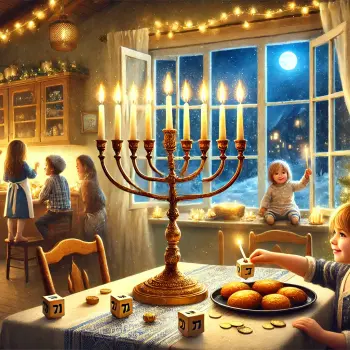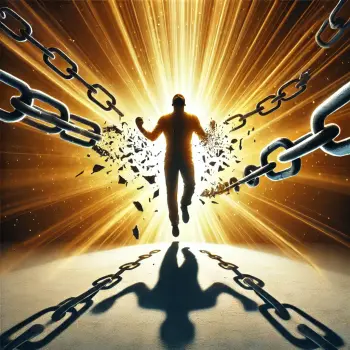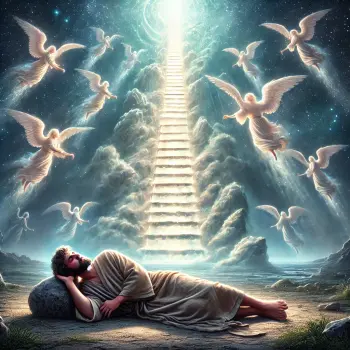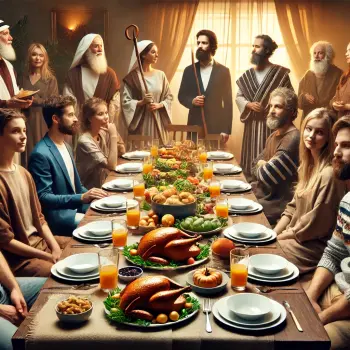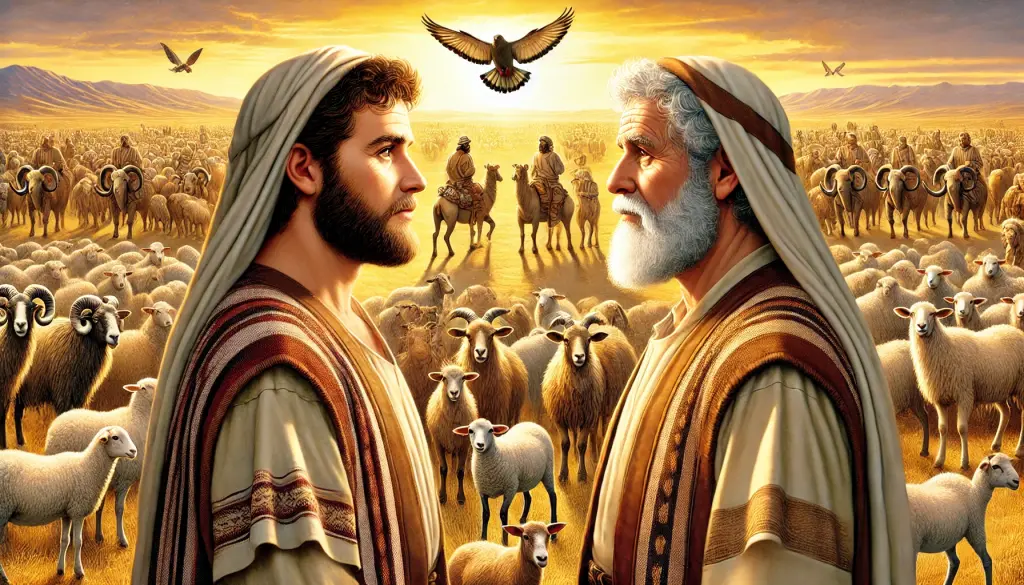
‘Tis the season for parties, gifts, bonuses, and vacations. And it’s also the season for comparisons. Who threw the most lavish party? Who got the largest bonus? Who got the most gifts? The best gifts? Who visited the most exclusive resorts? It’s our annual yardstick for determining who has more and who is the most successful.
Jacob’s Journey Home
If we flash back a few thousand years, this week’s Torah portion is remarkably similar. In Parashat Vayishlach (Genesis 32:4-36:43), Jacob has spent 20 years with his father-in-law, Laban, with each one trying to outsmart and outmaneuver the other. Now he is returning home, returning home to face a brother, Esau, who might still want him dead.
Unsurprisingly, Jacob is somewhat apprehensive. He sends messengers to Esau to tell him that he has become quite successful with impressive numbers of flocks and herds. The messengers return to tell him that Esau is personally coming out to greet him with 400 men. Jacob’s apprehension ratchets up to near panic.
Fearing for his life, he divides his camp in half hoping that if one group is attacked, the other will survive. He offers a heartfelt prayer to God, reminding God of the promises made all those years ago when he set out on this journey, emphasizing the promise to return him whole to his father’s house. He selects generous gifts from his flocks and herds for his brother and instructs his servants to divide these droves into thirds, telling Esau each time that these are gifts for him and Jacob is just behind. Jacob assumes that bribing Esau with good gifts will assuage his anger.
Jacob then ferries his family and his possessions across the Jabbok River and waits on the other side alone for the night. It is here that Jacob experiences his second significant mystical night-time experience. Throughout the entire night he wrestles with something or someone. Even he is uncertain. Is it a heavenly messenger or angel, Esau, or just himself with whom he is struggling?
As dawn is breaking, his opponent asks Jacob to release him. Jacob says, “Not unless you bless me.” The other asks his name. When Jacob replies, “Jacob,” his opponent tells him, “No longer shall you be called Jacob, but Israel, because you have striven with beings divine and human and have prevailed.”
Shortly thereafter, he meets Esau, and they reconcile. When Jacob tries to convince Esau to take all of the gifts Jacob has sent, Esau responds that Jacob should keep them, he has no need for them; he has plenty. Jacob replies, “God has been gracious to me, and I have everything.” He then convinces Esau to accept the gifts.
Are We Jacob?
This story goes well beyond fraternal reconciliation. Delving into it we discover truths about Jacob’s character and the nature of human beings. Jacob is not a one-dimensional paragon of piety. He is complex and conflicted, like most of us. On the one hand, he measures success by stuff. Look at the sheer number of sheep, goats, camels, cattle and donkeys, not to mention wives, concubines and children. He is without a doubt, well-to-do, and measures his success by all that he has acquired. Not only does he measure success this way, but he assumes that Esau does as well. Why else would he try to overwhelm him with generosity? Not only should Esau see Jacob as successful, but this success will also enrich Esau.
But there is the other hand. In his desperate prayer to God, Jacob says, “I am unworthy of all the kindness that You have so steadfastly shown Your servant: with my staff alone I crossed this Jordan, and now I have become two camps.” Literally he says, “I have been made small by all the kindness and faithfulness You have shown me.” Reflecting, not on the material wealth he has acquired, but on the spiritual and emotional support he has received makes Jacob feel smaller, less significant. When we are shown kindness and compassion, especially during those times when we are feeling fragile and vulnerable, we can reframe our experience. Material possessions slip into the background, while relationships and values move into the foreground.
Jacob in this time of crisis has a moment of clarity; the stuff he has worked for and acquired over the course of 20 years is not as important as the kindness and faithfulness that he has experienced over those same 20 years.
But moments of clarity are just that, moments. How quickly he reverts to material possessions to propitiate Esau. Esau acknowledges material wealth as the measuring stick: he says that he has plenty. literally much. But clarity is a funny thing. It finds its way back when it’s triggered by the right stimuli. Reflecting on his night of wrestling and reuniting with his brother after 20 years, Jacob once again shifts perspective by saying “I have everything (or all).”
God’s Gifts or the Gift of All?
The Or HaChaim, Rabbi Chaim ibn Attar from 18th century Morocco, said that it was because of God’s gift that Jacob lacked nothing. The Sefat Emet, Rabbi Yehudah Aryeh Leib Alter from 19th century Poland, takes issue with him. It isn’t the gift that left Jacob satisfied; it was the attachment. According to the Sefat Emet, whoever is attached to God, has “all.” Everything has a point of divine life. In that point, all is included. Each point of divine energy encountered in the world around us is a microcosm of the entire divine realm. Whether one is a pauper or a prince he or she still has access to the same experience of the divine. Each individual is able to get everything they need. Thus, God is called shalom because every point of divine energy contains all. Esau had much; “muchness” comes from human hands. Only from God can oneness be found and that oneness is the source of everything in the universe.
When Jacob was truly focused, he recognized what was of ultimate importance and value. When he was distracted or paying too much attention to the success and failure of those around him he could only see what was at best penultimate.
This is a time of year when it’s easy to get swept up in material excess. We are bombarded daily with appeals to what we need, to what we can’t live without, and to the fear that we’ll be the last to get “it”, whatever that “it” is. We are lead to compare our lives, successes, and material possessions with those around us. Most of us already have plenty of much. Do we really need that much more?
It doesn’t hurt to have some creature comforts, but perhaps we’d be better off deepening our relationships, strengthening our connections, and seeking those moments of clarity.





